|
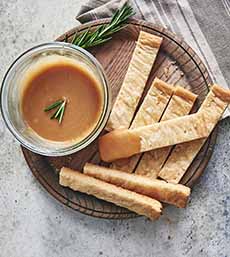
[1] Salted rosemary caramel sauce, served with shortbread for dipping. The caramel recipe is below (photos #1, #3, © King Arthur Baking).
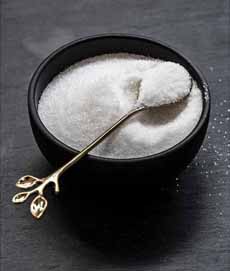
[2] To make the caramel, start with granulated sugar (photo © Hannah Kaminsky | Bittersweet Blog).
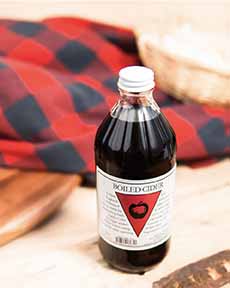
[3] Boiled cider goes into the caramel sauce to add deeper, more complex flavor than traditional caramel. Here’s how to use it at every meal (photo © Cheese And Wine Traders).

[4] Heavy cream goes into the pan (photo © Dairy Farmers Of Wisconsin).

[5] A few tablespoons of butter (photo © DeLaurenti).
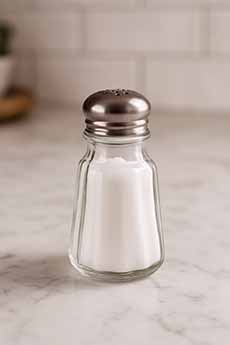
[6] A bit of salt (photo generated by ChatGPT 2025-04-25).

[7] And finally, fragrant fresh rosemary. See other uses for it in the footnote* below (photo © Burpee).
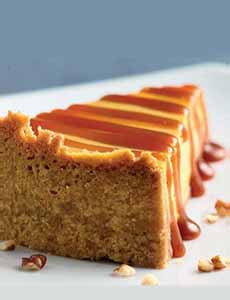
[8] Cheesecake with caramel sauce: an easy road to glamour.
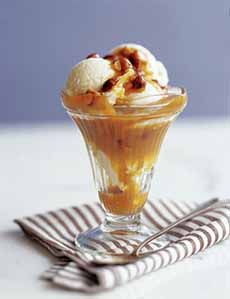
[9] A classic caramel sundae (photo © National Honey Board).
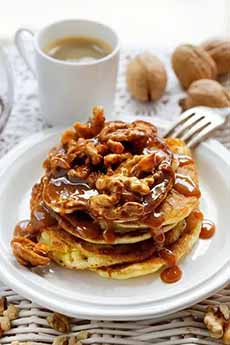
[10] Breakfast or dessert: pancakes topped with toasted nuts and caramel sauce (photo © Umami Information Center).
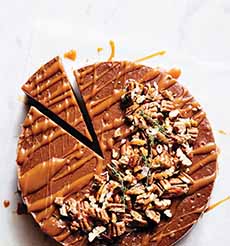
[11] A plain nut torte gets the glam treatment with toasted nuts and honey.
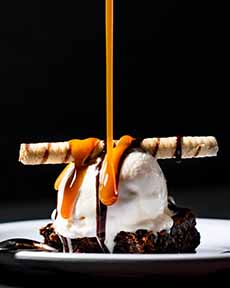
[12] This is so easy to put together from store-bought brownies, ice cream, caramel sauce, and rolled wafer cookies (photo © Kobby Mendez | Unsplash).
|
|
We stayed home and made caramel sauce today, because April 5th is National Caramel Day. We could have made caramel candy, but having made salted caramelsfor so many years, we decided to get with the trend and make salted caramel sauce.
The caramel sauce recipe below, from King Arthur Baking, adds another layer of flavor with a sprig of fresh rosemary.
Caramel sauce is just about the easiest thing you can make. It will be ready to eat in 10 minutes. Give it a bit of time to cool down if you want to pour it over ice cream.
> Otherwise, check out all the uses for caramel sauce below.
Caramel sauce is made from the same ingredients as caramel candy. The best recipes are simply cream, butter, sugar, and flavoring such as vanilla—although cayenne, coffee, lavender, maple, and pretty much anything you feel like can be used.
Salt can be added to make salted caramel sauce; chocolate can be added to make chocolate caramel.
At room temperature, a good sauce will be almost as thick as caramel candy, and can be eaten from the jar as “spoon candy.” We often enjoy it that way.
Caramel sauce (as opposed to caramel syrup) thickens at room temperature and needs to be heated to become pourable.
We’ll get to the recipe in a minute, but first:
> More uses for caramel sauce, below.
> The different types of dessert sauces: a photo glossary.
> The year’s 15 caramel, butterscotch, and toffee holidays, below
> The history of caramel.
> More uses for fresh rosemary, below.
RECIPE: SALTED ROSEMARY CARAMEL SAUCE
Ingredients
3/4 cup (149g) granulated sugar
2 tablespoons (43g) boiled cider
1/2 cup (113g) heavy cream
2 tablespoons (28g) butter
1/4 teaspoon table salt
1 sprig (4″) fresh rosemary
Preparation
1. COMBINE all the ingredients in a medium, heavy-bottomed saucepan. The syrup will bubble up during cooking, so use a pan that holds at least 1 quart. Stir briefly to combine.
2. PLACE the pan over medium heat and cook, stirring occasionally, until the sugar dissolves. From this point on, swirl the pan instead of stirring; this will help prevent crystals from forming and making the sauce grainy.
3. CONTINUE to cook over medium heat without stirring until the mixture reaches 230°F when measured with a digital or candy thermometer. Watch carefully—do not walk away—while the caramel is simmering: It can quickly climb in temperature near the end of the cooking process.
4. REMOVE the pan from the heat. Let the sauce cool for a few minutes before straining it into a heatproof container to remove the rosemary. Don’t worry if the sauce seems thin; it will thicken as it cools.
You are now ready to enjoy a spoonful, and to use the sauce as we’ve demonstrated in the photos—just for starters.
Store caramel in the refrigerator in an airtight container. It can remain for many weeks. Reheat briefly before serving.
USES FOR CARAMEL SAUCE
Caramel sauce is incredibly versatile! Here are some delicious ways to use it:
Caramel For Dessert
Drizzle over ice cream or a whole-hog sundae.
Use as a topping for cake—carrot cake, cheesecake, pound cake and other loaf cakes.
Yogurt dessert parfait: layer Greek yogurt with chocolate chips and berries, and drizzle with caramel sauce.
Caramel At Breakfast
Drizzle over French toast, pancakes, or waffles.
Sweeten on toast or bagels (especially with cream cheese).
Stir into oatmeal or plain yogurt.
Caramel Beverages
Flavor cold brews, lattes, mochas.
Add to hot chocolate or warm milk.
Use in milkshakes.
Caramel Snacks
A filling for sandwich cookies.
Dip apple, banana, or pear slices and strawberries.
Dip pretzels and shortbread cookies.
Make a sweet dip by blending caramel into mascarpone, ricotta, or yogurt.
Caramel & Cheese
As a cheese condiment, pair caramel with:
Brie and Camembert: Caramel’s sweetness enhances their creamy mildness and subtle mushroom undertones.
Caramelly cheeses: aged Gouda, Alpine cheeses, Gjetost†, and Gruyère are known for their caramel notes.
Cream cheese, goat cheese, and mascarpone: caramel turns their milky richness into caramel cheesecake filling.
Aged Cheddar: The sharper the Cheddars, the more sophisticated the sweet-savory pairing.
Blue Cheese: The saltiness and pungency of blue cheese creates a complex, adventurous contrast with the sweet, buttery caramel.
THE DIFFERENCES BETWEEN CARAMEL SAUCE, BUTTERSCOTCH SAUCE, TOFFEE SAUCE & DULCE DE LECHE
These dessert sauces are similar and usually interchangeable, but have distinct differences in ingredients and flavor profiles:
Caramel Sauces
Method: Made by heating sugar until it melts and browns.
Ingredients: Cream, butter, and vanilla, added after the sugar caramelizes.
Flavor: A rich, sweet flavor with slight bitterness from the caramelized sugar.
Color: Medium amber.
Texture: Smooth, pourable when heated.
Butterscotch Sauce
Method: Made by cooking brown sugar (not caramelized white sugar) with butter.
Ingredients: Cream, vanilla, and sometimes a pinch of salt.
Flavor: A distinctive buttery flavor with notes of molasses from the brown sugar.
Color: Lighter golden-amber.
Texture: Often slightly thinner than caramel sauce.
And despite its name, butterscotch contains no Scotch whisky. The name derives from “scotched” (scorched) butter.
Toffee Sauce
Method: Similar to butterscotch but cooked longer and to a higher temperature.
Ingredients: Brown sugar, butter, and cream.
Flavor: A deeper, more intense flavor with stronger butter notes, sometimes with a hint of nuttiness.
Color: Often cooked until slightly thicker and darker than butterscotch.
Texture: Can be slightly chewier or thicker at room temperature.
Dulce de Leche Sauce
Method: Made by simmering sweetened condensed milk (or milk and sugar) for hours until the milk proteins caramelize.
Ingredients:
Flavor: A distinctive milk caramel flavor.
Color: Deeper tan to light brown.
Texture: Thicker and more spreadable than the others.
The key difference between dulce de leche and cajeta is the type of milk used. The former is made with cow’s milk and the latter is made with goat’s milk.
15 CARAMEL, BUTTERSCOTCH & TOFFEE HOLIDAYS
January 8: National English Toffee Day
January 23: International Sticky Toffee Pudding Day
January 26: National Blonde Brownie (Butterscotch Brownie) Day
February 15: National I Want Butterscotch Day
February 21: National Sticky Bun Day
March 19: National Chocolate Caramel Day
April 5: National Caramel Day
April 6: National Caramel Popcorn Day
May 9: National Butterscotch Brownie Day
July 8: National Ice Cream Sundae Day
September 15: National Butterscotch Cinnamon Pie Day
September 19: National Butterscotch Pudding Day
October: National Caramel Month
October 31: National Caramel Apple Day
November 25: National Parfait Day
________________
*More uses for fresh rosemary: Beyond its primary use as a seasoning for meat, poultry, and seafood; in vegetable and grain dishes and stuffing; in breads, crackers; and on eggs and pizza; and as a popcorn seasoning; there’s a wealth of opportunity to use this lovely herb.
> Infuse into honey, olive oil, salt, sugar, vinegar.
> Add to cold drinks: herb water and plain sparkling water, lemonade, limeade.
> Add to condiments: dips, ketchup, mayonnaise, mustard.
> Make tea herbal tea or syrup.
> Use as skewers.
> Make compound butter and pesto.
> Add to sweet baked goods, including cookies, muffins, and olive oil cake.
> Add to homemade jams and jellies.
> Make herb ice cubes for cocktails, soft drinks, and juices.
> You can also freeze the sprigs for future use.
*Gjetost is a Norwegian cheese also known as Brunost, some people do not believe upon tasting it that Gjetost is a cheese. It tastes just like caramel—but with the consistency of Cheddar.
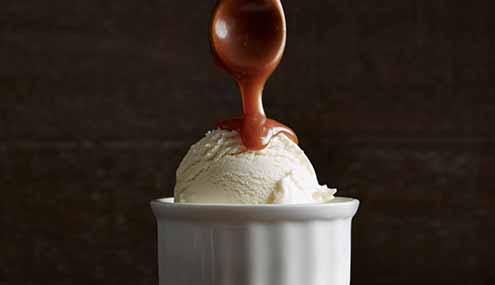
[13] Since you’ve gotten all the way to the end, treat yourself to a little snack (photo © Eclat Chocolate).
|














